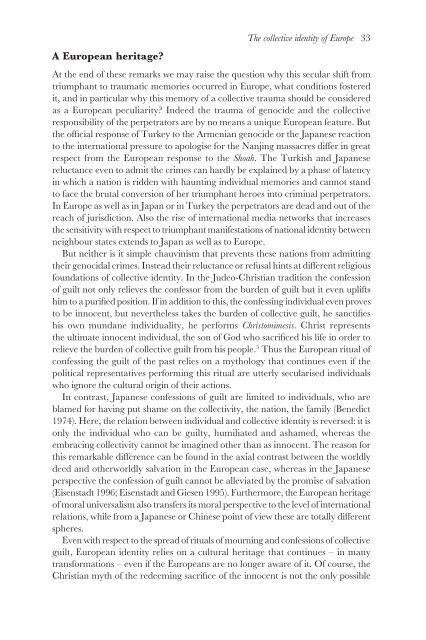Europeanisation, National Identities and Migration ... - europeanization
Europeanisation, National Identities and Migration ... - europeanization
Europeanisation, National Identities and Migration ... - europeanization
Create successful ePaper yourself
Turn your PDF publications into a flip-book with our unique Google optimized e-Paper software.
A European heritage?<br />
The collective identity of Europe 33<br />
At the end of these remarks we may raise the question why this secular shift from<br />
triumphant to traumatic memories occurred in Europe, what conditions fostered<br />
it, <strong>and</strong> in particular why this memory of a collective trauma should be considered<br />
as a European peculiarity? Indeed the trauma of genocide <strong>and</strong> the collective<br />
responsibility of the perpetrators are by no means a unique European feature. But<br />
the official response of Turkey to the Armenian genocide or the Japanese reaction<br />
to the international pressure to apologise for the Nanjing massacres differ in great<br />
respect from the European response to the Shoah. The Turkish <strong>and</strong> Japanese<br />
reluctance even to admit the crimes can hardly be explained by a phase of latency<br />
in which a nation is ridden with haunting individual memories <strong>and</strong> cannot st<strong>and</strong><br />
to face the brutal conversion of her triumphant heroes into criminal perpetrators.<br />
In Europe as well as in Japan or in Turkey the perpetrators are dead <strong>and</strong> out of the<br />
reach of jurisdiction. Also the rise of international media networks that increases<br />
the sensitivity with respect to triumphant manifestations of national identity between<br />
neighbour states extends to Japan as well as to Europe.<br />
But neither is it simple chauvinism that prevents these nations from admitting<br />
their genocidal crimes. Instead their reluctance or refusal hints at different religious<br />
foundations of collective identity. In the Judeo-Christian tradition the confession<br />
of guilt not only relieves the confessor from the burden of guilt but it even uplifts<br />
him to a purified position. If in addition to this, the confessing individual even proves<br />
to be innocent, but nevertheless takes the burden of collective guilt, he sanctifies<br />
his own mundane individuality, he performs Christomimesis. Christ represents<br />
the ultimate innocent individual, the son of God who sacrificed his life in order to<br />
relieve the burden of collective guilt from his people. 5 Thus the European ritual of<br />
confessing the guilt of the past relies on a mythology that continues even if the<br />
political representatives performing this ritual are utterly secularised individuals<br />
who ignore the cultural origin of their actions.<br />
In contrast, Japanese confessions of guilt are limited to individuals, who are<br />
blamed for having put shame on the collectivity, the nation, the family (Benedict<br />
1974). Here, the relation between individual <strong>and</strong> collective identity is reversed: it is<br />
only the individual who can be guilty, humiliated <strong>and</strong> ashamed, whereas the<br />
embracing collectivity cannot be imagined other than as innocent. The reason for<br />
this remarkable difference can be found in the axial contrast between the worldly<br />
deed <strong>and</strong> otherworldly salvation in the European case, whereas in the Japanese<br />
perspective the confession of guilt cannot be alleviated by the promise of salvation<br />
(Eisenstadt 1996; Eisenstadt <strong>and</strong> Giesen 1995). Furthermore, the European heritage<br />
of moral universalism also transfers its moral perspective to the level of international<br />
relations, while from a Japanese or Chinese point of view these are totally different<br />
spheres.<br />
Even with respect to the spread of rituals of mourning <strong>and</strong> confessions of collective<br />
guilt, European identity relies on a cultural heritage that continues – in many<br />
transformations – even if the Europeans are no longer aware of it. Of course, the<br />
Christian myth of the redeeming sacrifice of the innocent is not the only possible



